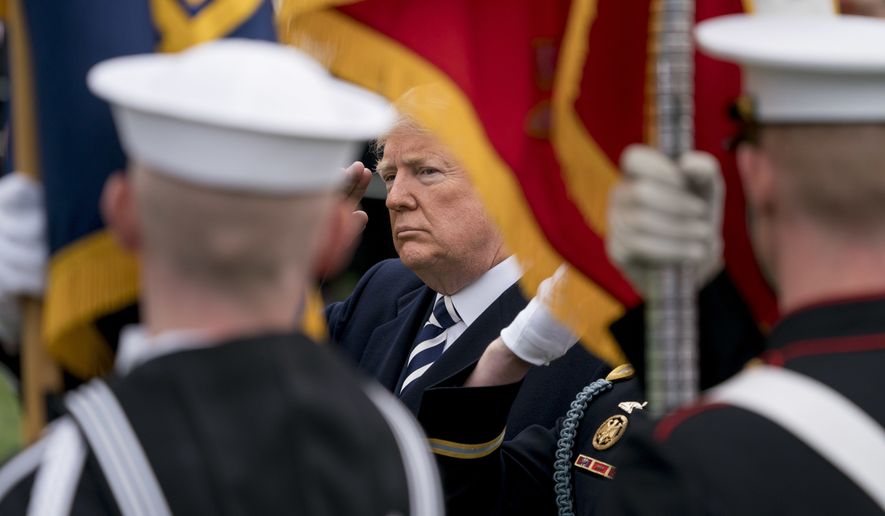The Pentagon’s ability to carry the fight to the Islamic State, al Qaeda and other terrorist groups around the world was on the line Wednesday as a key Senate committee struggled to define — and possibly limit — President Trump’s legal authority to wage war.
While virtually all lawmakers agree that a new Authorization for Use of Military Force is necessary and that the 2001 and 2002 versions now in place are hopelessly outdated, there is far less of a consensus on what the legislation should look like and how much latitude to give the president.
Some Democrats raised the notion that the White House could twist the Senate’s broad bill into a green light for attacks against Iran, though Trump officials dismissed the idea as ludicrous.
“I do think the question here is that, yes, we will authorize the war against these entities, but we’re also going to authorize war against unforeseen actors,” said Sen. Robert Menendez of New Jersey, the ranking Democrat on the Foreign Relations Committee.
Mr. Menendez also explicitly asked whether the latest authorization could be expanded to include Iran, which is widely considered to be one of the world’s leading state sponsors of terrorism.
“I think that there is a real danger of the kind creative executive branch lawyering … that could use that definition for using force in situations like that,” said Rita Siemion, a Georgetown University law professor and counsel at the advocacy group Human Rights First who testified before the committee Wednesday.
Sen. Bob Corker, Tennessee Republican and committee chairman, dismissed that argument as a “red herring” perpetrated by liberal groups trying to undermine his panel’s work.
An administration official told The Washington Times later Wednesday that using the proposed AUMF for attacks inside Iran “is not even on the playing field we’re working on” and that the White House is focused solely on legal powers to fight the Islamic State, al Qaeda and other terrorist organizations that pose direct threats to American citizens and interests.
The proposal, sponsored by Mr. Corker, Sen. Tim Kaine, Virginia Democrat, and others, would give the president explicit authority to wage war on “the Taliban, al Qaeda, the Islamic State in Iraq and Syria, and the designated associated forces.” Those associated forces include al Qaeda in the Arabian Peninsula and al-Shabab.
Defense Secretary James Mattis said the military would benefit greatly from a fresh congressional authorization for action against those groups.
The bill also lists Afghanistan, Iraq, Syria, Somalia, Yemen and Libya as countries in which the president is explicitly authorized to use force. Some lawmakers, though, argue that the text could be interpreted easily to allow strikes elsewhere.
One case is Iran, which has ties to some of the terrorist groups listed in the bill. The White House could provide a legal argument for targeting those groups inside Iran.
If the president extended military action beyond the six specific nations listed, then Congress would have the authority under the legislation to retroactively disapprove those strikes, and stop them from continuing. Critics say the system would be foolish at best and blatantly unconstitutional at worst. The president would veto any vote of disapproval, so stopping the military action would take a two-thirds supermajority in Congress.
“The only way we can stop him … is to have a two-thirds vote. We have completely flipped the Constitution on its head,” said Sen. Rand Paul, Kentucky Republican. “I cannot more strongly object to doing this. This will be an unconstitutional delegation of authority to the president without question.”
Concern about presidential overreach has some basis. Lawmakers agree that the current AUMFs have been stretched far beyond their original purposes and that it’s virtually impossible to know how a future president might interpret a new version.
The 2001 AUMF, passed in the immediate aftermath of the Sept. 11 terrorist attacks, provided the legal basis for American intervention in Afghanistan. An AUMF passed in 2002 set the stage for the Iraq War.
Since then, Congress hasn’t weighed in with explicit authority.
President Obama relied on the existing AUMFs in his second term to justify strikes against the Islamic State in Syria and to detain Islamic State fighters.
“The current AUMF is nearly 17 years old. … There’s also a growing risk that the further we get from the Sept. 11, 2001, attacks that the courts could call into question or limit the existing authorization,” said Mr. Corker, conceding that claiming power to fight the Islamic State took “some legal stretching.”
In 2015, Mr. Obama tried to get an updated AUMF, but a bill failed to clear Congress.
The proposed legislation calls for a quadrennial review that, in theory, would allow Congress to update the lists of countries and groups. It contains no sunset provision, allowing the measure to remain in effect indefinitely.
“We’re at loggerheads here,” said Sen. Benjamin L. Cardin, Maryland Democrat. “I don’t know any other way than a sunset [provision] in order to preserve the rights to our constitutional protections.”
The bill appears likely to pass the Foreign Relations Committee, though its prospects in the full Senate are unclear.
• Ben Wolfgang can be reached at bwolfgang@washingtontimes.com.




Please read our comment policy before commenting.